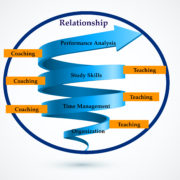How ADHD Coaching Can Help You Reclaim Your Energy, Focus & Life
If you’re an adult with ADHD and feeling like life is just too much, you’re not alone. That sense that you’re always behind, even when you haven’t stopped moving all day? The anxiety that builds every time another task falls through the cracks, or you forget something important? That mental fog you can’t shake? The guilt from being late again, even though you really tried this time? This is not a personal failure. It’s ADHD and the burnout that often comes with it.

ADHD Burnout Is Real, and It Hurts
Many adults with ADHD are juggling multiple roles and responsibilities. You might be working a full-time job, raising kids, managing a household, caring for aging parents, or all of the above. At the same time, you’re constantly navigating a brain that doesn’t respond to the world the way most systems are built to support.
The result? A kind of exhaustion that’s deeper than being tired. This is burnout of the body, mind, and spirit. You may feel like you’re constantly putting out fires while falling further behind, no matter how hard you try.
Maybe you’re thinking:
– “I know I need to make a schedule, but I can’t seem to stick to it.”
– “I keep missing deadlines, even for things I care about.”
– “I try so hard to get organized, and then the clutter takes over again.”
– “People think I don’t care—but they don’t see how hard I’m trying.”
It’s frustrating. It’s heartbreaking. And worst of all, it can make you feel like you’re failing at life when you’re already working twice as hard just to keep up.
ADHD burnout can also lead to decision fatigue, trouble sleeping, loss of motivation, and even physical symptoms like headaches, muscle tension, or digestive issues. When your mind is constantly overloaded, your whole body feels the impact.
The Hidden Toll: ADHD, Reputation, and Relationships
ADHD is more than being forgetful or distracted. It can shape how others see you and how you see yourself.
Chronic lateness, forgotten tasks, missed follow-through: even when they’re unintentional, they can affect your career, your friendships, and your self-esteem. You may feel like people have stopped trusting you. Or you may notice yourself avoiding opportunities out of fear that you’ll let someone down again.
And then there’s the emotional weight of trying to appear “normal.” So many adults with ADHD become masters at masking. You might present a capable, cheerful front, while secretly running on empty behind the scenes. That disconnect can leave you feeling isolated, misunderstood, and emotionally exhausted.
This kind of emotional masking is exhausting over time and can disconnect you from your own needs. You may have become so used to pretending everything is fine that you don’t know what support even looks like anymore. But it’s not too late. There is a way forward and you don’t have to find it alone.
Coaching Is Not Just Help, It’s Hope
ADHD coaching is a personalized, forward-focused partnership that empowers you to build a life that works with your brain—not against it.
Unlike therapy, which often explores the past, ADHD coaching is about practical, real-world strategies for the present and future. And unlike courses or books, coaching is tailored to your unique goals, patterns, and challenges. You’re not left to figure it out alone. You have a guide, an accountability partner, and a cheerleader all in one.
Your coach will help you:
– Clarify your priorities
– Break down overwhelming tasks
– Create structures that actually stick
– Work through emotional blocks like shame, self-doubt, and perfectionism
– Reconnect with your own strengths and values
And most importantly, coaching helps you start to believe in yourself again.

Here’s How ADHD Coaching Can Help
- Time Management & Time Blindness
- Planning, Prioritizing & Goal Setting
- Follow-Through & Task Completion
- Organization & Sustainable Systems
- Focus, Attention & Emotional Regulation
- Self-Awareness & Adjustments That Work
Real-Life Changes Coaching Creates
Adults who work with an ADHD coach often experience meaningful changes across every area of life:
– Career: You may finally feel confident following through on projects, speaking up in meetings, or organizing your workload in a sustainable way.
– Home Life: You might find yourself maintaining routines, keeping up with tasks, and making your living space feel less like a source of shame and more like a place of comfort.
– Health: Coaching often helps clients create better sleep schedules, follow through with doctor appointments, manage medications more consistently, or build in regular meals and movement.
– Relationships: When you start to feel more in control and less reactive, your interactions improve. You’re less overwhelmed, more present, and better able to advocate for your needs.
And most importantly, you begin to rewrite your inner narrative—from “I’m always behind” to “I know how to make things work for me.”
But Will Coaching Really Work for Me?
Maybe you’ve tried everything: planners, apps, productivity books, even therapy. Maybe some of it helped… a little. But nothing seems to stick.
Here’s why ADHD coaching is different:
– It’s not generic. Your coach helps you uncover the specific barriers that get in your way—and build solutions tailored to your personality and environment.
– It’s not passive. You’re not just learning—you’re doing. Every week, you make practical changes with someone by your side.
– It’s not judgmental. You’re not failing. You’re learning. And every step forward no matter how small, counts.
This is support that evolves with you. When life shifts, your coach helps you adapt, so you’re never alone in figuring it out.
Research supports this approach. A growing body of evidence recognizes ADHD coaching as a valuable, non-pharmacological intervention. One study in Neuropsychiatric Disease and Treatment found that coaching improves executive functioning, reduces emotional overload, and helps adults manage their daily lives with greater ease (Bachmann et al., 2020). A European consensus paper also emphasizes coaching’s role in increasing structure, self-awareness, and sustainable behavior change for adults with ADHD (Kooij et al., 2019).
You’re Not Broken. You’re Just Wired Differently
ADHD isn’t a character flaw. It’s a neurodevelopmental difference affecting attention, motivation, and executive function. That’s not your fault. And with the right support, it doesn’t have to define your limits.
Imagine what your life could look like if your days felt less chaotic. If your mornings had structure. If your brain had space to breathe. If you actually felt capable—not just once in a while, but consistently.
You don’t need to become a different person. You just need tools that let you show up as the best version of who you already are.
Ready to Thrive Instead of Just Survive?
If you’re feeling burned out, stuck, or like you’re barely holding it together—this isn’t the end of your story. It’s the beginning of a new one.
With ADHD coaching, you can:
– Build habits that align with your energy and focus
– Take control of your time and responsibilities
– Make meaningful progress on the goals that matter most
– Finally feel like your life is working for you—not against you
You can shift from a constant state of overwhelm to one of clarity, intention, and growth. This doesn’t happen overnight, but it does happen. And coaching can be the catalyst that turns things around.
You don’t have to do this alone. You don’t have to stay overwhelmed. And no, it’s not too late for you.
👉 Start Your ADHD Coaching Journey Today
Take the first step toward clarity, confidence, and calm. Reach out to explore how ADHD coaching can support you—your brain, your goals, your life. Because a better way *is* possible. And it starts here.
Schedule a free consultation or learn more about ADHD coaching here:
Bachmann, C. J., Philipsen, A., & Hoffmann, F. (2020). ADHD in adulthood—Current diagnosis, treatment, and patient management*. Neuropsychiatric Disease and Treatment, 16, 273–287. https://doi.org/10.2147/NDT.S233111
Kooij, J. J. S., Bijlenga, D., Salerno, L., et al. (2019). Updated European Consensus Statement on Diagnosis and Treatment of Adult ADHD*. European Psychiatry, 56, 14–34. https://doi.org/10.1016/j.eurpsy.2018.11.001










